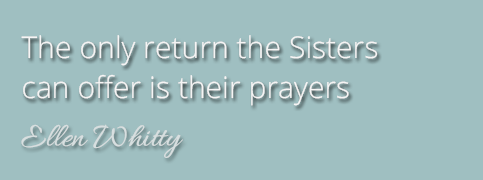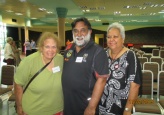A Forum on Indigenous Recognition - 17 February, Brisbane Qld
In 2011, a year commemorating the 150th anniversary of the arrival of the first members of the congregation in Queensland, the Brisbane Sisters of Mercy determined that we would pursue advocacy for justice in three areas - one of which was the relationship between those whose history in this land dates back 60,000+ years and those of us who have arrived here so recently. The non-recognition of this reality in the founding document of our nation is a grave omission which we believe all Australians are now being called to address. Our political leaders are broadly supportive of such a referendum but historically success in such a vote is not easy to achieve. As the 1967 referendum proved the wider community must be engaged. We Sisters felt the need to hear the perspectives of those most directly involved – the Indigenous members of our nation. We believed that others would also be keen to join such a conversation.
On 17 February, the Brisbane Sisters of Mercy brought together an expert panel to discuss the proposed referendum on recognition in our Federal Constitution of the prior and continuing presence in this land of the Aboriginal and Torres Strait Islander Peoples. The forum was supported by Recognize, the official movement working Australia-wide and ANTaR (Australians for Native Title and Reconciliation)
Joan Hendriks, prominent elder of the Ngugi people of Moreton Bay in her acknowledgement of country stressed the importance of a balanced way of life that honoured both family and place. Guests at both the repeated day and evening sessions were welcomed by the Congregational Leader, Catherine Reuter rsm.
The distinguished panellists, Dr Jackie Huggins AM, Deputy Director of Aboriginal and Torres Strait Islander Research Unit UQ, Les Malezer, co-chair National Congress, Mary Graham, Adj A/Prof, UQ, Ian Brown LLB, immediate past president of the Queensland Law Society, each contributed from their long and extensive personal experience and expertise.
Their input has given us the impetus to understand more clearly that there are differing viewpoints among Indigenous about the advisability, the timing, the extent of constitutional change and the import and impact of Constitutional Recognition. Les Malezer who has long worked at the UN on the recognition of the rights of Indigenous Peoples placed Australia’s lagging record within a world context. We were led to think more deeply about what we expect from such a referendum, to question whether there are alternatives to this and to hear of the desired Indigenous goals of sovereignty, self–determination, treaty between Aboriginal peoples and those of us who have come in the past 200 years. We have been assisted, too, in identifying objections to the referendum which will need to be met by cogent, calm argument. For one speaker, Mary Graham, the relationship between Aboriginal and mainstream Australians needs to be reset by treaty between equals before any move towards Constitutional recognition. For Ian Brown, Australians, innately conservative and unused to fighting for their rights, do not respond positively to requests for major change – only 8 out of 44 referenda have been successful. For Jackie Huggins we are being given the opportunity to demonstrate our respect for the First Peoples who have cared for this land over many thousands of years – an opportunity that, if missed, will not be ours again this generation.
Questions from the floor were incisive and varied. In response, the need was acknowledged for regular community conversation, for education, for better information and analysis in media, for more urgency and clarity from our political leaders, for authentic partnership, for greater trust in the courage to change and in the strong sense of fairness of our fellow Australians.
We are greatly indebted to the panellists and to the chair, Jackie Huggins, for their shared wisdom. Our hope is that this forum is another step in the journey towards deeper understanding and an incentive to us all to continue to work for an acknowledgement of all the chapters of the history of this land - including the most recent often conflicted one. Only recently have we withdrawn the original claim of terra nullius, an empty land
In the apt words of the chorus of our concluding song :
Write the first chapter
And right the next chapter
We can’t build a nation on lies. (Helen Kearins rsm)
Now is the time to commit to working where we can for honest acknowledgement of all our past and present story - for justice, reconciliation and freedom - and for a future that harnesses the gifts of all our citizens - from the members of the oldest living culture on the planet to the newest arrivals on our shores.

 Member Login
Member Login
